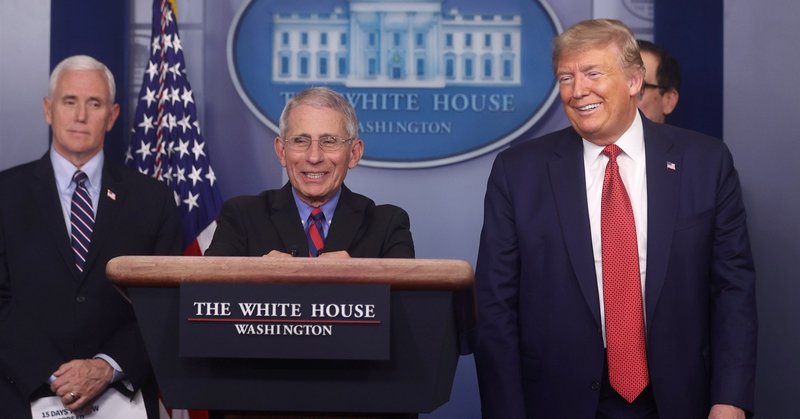
トランプのカオス会見と手柄
これは以下の記事に触発されて書いたものです。
* * *
トランプの毎日のコロナ会見はしばしばカオス状態になるんだけど、全ての雑音を取り払えば、米国のコロナ対応は着々と前進してるのは分かる。トランプの人格異常的な反応だけ取り上げて中身を米国民に解説しないメディアは役立たずだと思っていたが、この記事は割と冷静。
トランプのしばしばバカにされる言動は、(1) コロナを舐め腐っていた、(2) 今でも奇跡のように米国は回復すると言いふらす、(3) 前政権のクソをいっぱい引き継いだとわめく、に集約される。そこから色々変形が出てくる。
それに加えて、トランプ政権がどんな対策を実施しても、必ず様々な官僚主義的遅れや技術的問題が出てきて、それをメディアは叩く。これに関しては、前職で巨大官僚機構の中で緊急対応ばかりやっていたので、政権よりメディアの方にイラついた。
通常運転に最適化してるシステムをある瞬間にギアを変えるとシステムに爆発的なストレスがかかる。BCPはそれを減少させるために用意されてるが、問題は人間だ。頭も体も一瞬で動き方を変える訓練をされてるのは軍やFEMAくらいだろう。だから、問題が出る度に彼らが会見に出てきて解決を解説する。
破壊者として有能なトランプは、官僚制度の通常運転を破壊することに最大の強みを発揮したのが良く見える。彼は官僚機構がどう動いているかそもそも理解していなかった節がある。盲蛇に怖じずで号令だけかける。FDAの異常な認可スピードや、財務省の例外づくしの援助の執行は、通常運転では無理。
非常時に通常運転で対応しようとする国は、当然「あれも出来ない、これも出来ない」になって麻痺する。官僚一人一人はその中で最大限できることをしようとするので、疲弊し、消耗したあげく、不満の爆発しか返ってこないので発狂する。悪いのはスイッチを変えないリーダーなのに。
トランプに戻ると、この記事は、彼が「何を言ったか」より、「何をしたか」を見ようとする。そして、次の7つを指摘している。
(1) 専門家の言うことを聞いている。
(2) 全国民にコミュニケートしている。
(3) 連邦政府の権限の行使を抑制している。
(4) 健康と経済の均衡を取ろうとしている。
(5) 常にポジティブでいようとしている。
(6) 州政府を助けている。
(7) コロナ・タスクフォースを副大統領のペンスに任せている。
冷静に彼がやってることだけを見れば、この通りなのだ。それを延々と否定しようとするメディアもあるけど、時間を無駄にしてる。
スタイルも政党も違うが、結局クオモもトランプも徹底した"Get things done" というアメリカらしいプラグマティストである点では同じだ。"結果が出なければ何の意味もない"というメンタリティだと思う。昨日も一昨日もトランプは嬉しそうにクオモの動画を使ったりしてたのは笑えた。
結局、日本に足りないのは人格異常者ではなくて、目標を設定して、それに向かって環境を全て巻き込んでブルドーザーのように進んでいく能力なのだろうと思う。
* * *
上記の7点について、詳しく知りたい方は、下の原文をご覧ください。
(1) He's listening to experts. The president says he listens to his gut — but his gut seems heavily informed by his brain. The president is consulting a vast array of advisers, outside experts, business leaders and fellow politicians as he goes about making his decisions. Two of America's most expert doctors, National Institute of Allergy and Infectious Diseases Director Anthony Fauci and State Department Ambassador-at-Large Deborah Birx, are helping lead Trump’s response and usually by his side at the daily White House briefings.
(2) He's communicating with the nation. Yes, the briefings go off the rails every day as they follow Trump’s guided tour through his mind — where grievances, false information and self-adoration are on display. But the briefings, held six or seven days a week, also tell the public in the most visible way possible that their government — and their president — is fighting for them. Trump shows he is knowledgeable about the state of play and the response, even amid misstatements and lies. Health experts, as well as Vice President Mike Pence and other officials, are always at some point able to deliver more sober accounts of the newest information. Meanwhile, the president takes questions and makes himself available.
(3) He's keeping federal power in check. Trump in one briefing proclaimed his “authority is total” — exactly what the U.S. Constitution says it is not. But his detractors are still waiting for his seizure of total power, which they have been predicting since before he was elected. His response to the coronavirus has, in reality, been remarkably restrained. His resort to the Defense Production Act to force industries to help has been extremely limited, wielded, as he has noted, more as a threat than a cudgel. Instead, Trump has invested enormous time speaking with industry leaders to secure their assistance.
Meanwhile, the White House guidelines for reopening the economy leave decision-making power to the states, a judicious use of federalism that acknowledges the widely differing conditions in various regions. Note the White House wording — “guidelines,” not “directives.” Decisions are left up to the governors, and guideposts are firmly based in meeting health criteria, like a “downward trajectory of influenza-like illnesses reported within a 14-day period.” This document must be a grave disappointment to the shriller voices on the right demanding a quick reopening. It was, however, obviously written by health experts, not economists. That said, Trump’s recent siding with protesters against the lockdown and calls for them to “liberate” three states with Democratic governors is both contemptible and contradictory to his own policy.
(4) He's trying to balance health and economic concerns. All that said, the president is clearly eager to get the economy revived as fast as possible. Though he is regularly portrayed as impulsive, Trump is so far resisting his impulses. And his deep concern with the economic collapse is more than warranted. Trump’s concern is with the barbers, waiters, factory workers, store clerks and so many others who are facing a financial abyss they never bargained for or deserved. Of course, they are also voters — and he will want to campaign with an improving economy. But that does not mitigate the wisdom of balancing health with economic destruction.
(5) He's staying positive. Trump was widely ridiculed for calling himself a “cheerleader for the country.” And true, this acolyte of “the power of positive thinking” got into trouble early on by deluding himself about the magnitude of the problem, but his can-do spirit will be needed to lead the country out of the crisis. Trump has celebrated health care workers, grocers, truck drivers and others now combating the pandemic, providing crucial moral support and showcasing for the nation its heroes. It’s an antidote he administers to his own self-centeredness.
(6) He's helping the states. Yes, he picks fights with governors, but Democratic state executives from New York Gov. Andrew Cuomo to California Gov. Gavin Newsom have praised Trump for his accessibility and help. They may, in part, be placating a prickly president, but it’s doubtful they are simply lying through their teeth. Trump is literally working seven days a week and is constantly on the phone with governors and world leaders, to coordinate the response to the pandemic.
(7) He appointed Pence to lead the coronavirus task force. Having covered the White House for many years, I can report that this was a vital step. Trump could have appointed a “coronavirus czar” or put an agency chief in charge. But a vice president has the power not to be ignored by the bureaucracy that must implement Trump’s policies. When the vice president, or someone working directly for him, calls, you answer the phone.
Trump’s mistakes and errors of judgment tend to get the greatest focus because he makes them so colorfully. But beneath the cacophony, there are meaningful benefits to his approach.
* * *
この記事はこのツイートに続く連ツイ。
1) トランプの毎日のコロナ会見はしばしばカオス状態になるんだけど、全ての雑音を取り払えば、米国のコロナ対応は着々と前進してるのは分かる。トランプの人格異常的な反応だけ取り上げて中身を米国民に解説しないメディアは役立たずだと思っていたが、この記事は割と冷静。https://t.co/fQxQHRwuYO
— yoͥ̊̈͋͌̆͑s̔hͯ̓͐͌ͬ́̈́̅il͆͂͋ͧͬͮo͌ͧ́ͮ̂͒̏̆̎̑̓̽̓gͫ̔̓͊͐̌ͦ (@yoshilog) April 21, 2020
もし記事が気に入ったら、サポートもよろしくお願いします! よしログ
